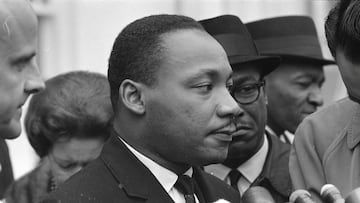The reason why we celebrate Martin Luther King Day
On the third Monday of every January, the US celebrates Martin Luther King Day, a federal holiday that pays tribute to the civil rights activist.


Held on the third Monday of January every year, Martin Luther King Day - also referred to as MLK Day - is a federal holiday in the US that marks the birthday of Baptist reverend and activist Dr. Martin Luther King, Jr., who was a leading figure in the American civil rights movement from the mid-1950s until his assassination in 1968.
Officially designated as a federal holiday by President Ronald Reagan in 1983, Martin Luther King Day was first observed in 1986. It is also known as a day of service - “a day on, not a day off” - on which Americans are urged to volunteer for charitable organizations to help their communities.
MLK Day is one of only two federal holidays to take place on someone’s birthday, with the other being the observance of George Washington’s birthday.
Martin Luther King, Jr: Who was he and what did he do?
Born on 15 January 1929 in Atlanta, Georgia, Dr. Martin Luther King, Jr. played a crucial role in bringing an end to racial segregation laws in the US and in advancing the rights of black Americans.
He rose to national prominence in 1955, after leading a bus boycott by African Americans in Montgomery, Alabama, which came about after Rosa Parks, the secretary of the local chapter of the National Association for the Advancement of Colored People, was arrested for refusing to give up her bus seat to a white passenger.
After going on to co-found the Southern Christian Leadership Conference, a civil rights group devoted to achieving equality for African Americans through non-violent protest, King helped to organize the 1963 March on Washington for Jobs and Freedom, a peaceful rally aimed at drawing attention to racial discrimination in the US.
During the historic March on Washington, which drew a gathering of around 250,000 people, King gave his iconic “I have a dream” speech - an address which spelled out his vision for equality and social justice in the US and is considered a defining moment of the civil rights movement.
The following year, President Lyndon Johnson signed into law the Civil Rights Act of 1964 - landmark legislation which, according to the government, “prohibits discrimination on the basis of race, color, religion, sex or national origin”. King was also influential in the passage of the Voting Rights Act of 1965, which outlawed racial discrimination in voting.
King’s contribution to the civil rights movement saw him named “Man of the Year” by TIME magazine in 1963. A year later, he was awarded a Nobel Peace Prize.
Martin Luther King’s assassination in Memphis
On 4 April 1968, having already survived an assassination attempt a decade earlier, King was shot dead on the balcony of his hotel in Memphis, where he had traveled to show his support for a sanitation workers’ strike.
Related stories

‘Blue Monday’: the only way is up

Martin Luther King Day: are grocery stores open?
James Earl Ray, a known racist who had escaped from jail just under a year before King’s assassination, pleaded guilty to the murder and was sentenced to 99 years in prison. Ray later recanted his confession, making unproven claims that he had been framed as part of a conspiracy behind King’s killing. He died in 1998, at the age of 70.
The Lorraine Motel, the hotel where King’s murder took place, was later converted into part of the site of the National Civil Rights Museum, which opened in 1991.